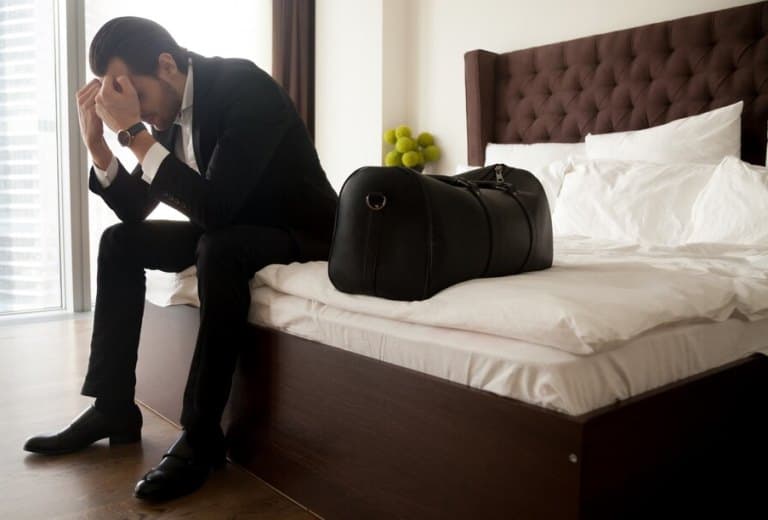Hotels are meant to provide a comfortable and safe environment for their guests. However, sometimes, due to the hotel’s negligence or intentional actions, guests may experience emotional distress.
Emotional distress can be defined as a psychological injury that a person suffers due to a traumatic event, such as an accident, assault, or any other event that causes mental anguish. In this article, we will explore whether a guest can sue a hotel for emotional distress and under what circumstances.

Image Credit: Freepik
What is Emotional Distress?
Emotional distress refers to the psychological harm or trauma that a person may suffer due to a particular event or situation. It is a non-physical injury that can be caused by various factors such as the death of a loved one, a traumatic experience, a physical injury, a relationship breakup, or other stressful situations.
Emotional distress can manifest in different ways, such as anxiety, depression, post-traumatic stress disorder (PTSD), sleep disturbances, or other emotional or behavioral changes. It can have a significant impact on a person’s daily life, causing them to experience difficulties in social relationships, work, and other areas.
While emotional distress is not a physical injury that can be seen or measured, it is still recognized as a valid injury in the legal system. In some cases, a person may be able to sue for emotional distress if they can demonstrate that another party’s actions or negligence caused them harm.
However, proving emotional distress in a legal setting can be challenging, and it often requires the help of mental health professionals to provide evidence of the harm suffered.
When Can You Sue a Hotel for Emotional Distress?
If you’ve experienced emotional distress as a result of a hotel’s actions, you may be wondering whether you have legal grounds to sue. Here are some common scenarios in which you may be able to sue a hotel for emotional distress:
Negligence and emotional distress
A hotel can be held liable for emotional distress if it was caused by the hotel’s negligence. Negligence occurs when a hotel fails to take reasonable care to prevent harm to its guests.
For example, if a hotel fails to maintain its property in a safe condition and a guest slips and falls, the hotel may be liable for any resulting emotional distress.
Intentional infliction of emotional distress
A hotel can also be held liable for the intentional infliction of emotional distress. This occurs when a hotel intentionally engages in conduct that is extreme and outrageous and causes severe emotional distress to a guest.
For example, if a hotel employee intentionally humiliates a guest or engages in other outrageous behavior, the guest may be able to sue the hotel for intentional infliction of emotional distress.
Proving emotional distress
Proving emotional distress can be challenging, as it is not a physical injury that can be seen or quantified. In most cases, a guest must show that the hotel’s conduct was the cause of their emotional distress and provide evidence of the emotional harm they suffered. This can be done through testimony from a mental health professional, family members, or friends who have witnessed the emotional distress.
Damages for Emotional Distress
If a guest is successful in proving their emotional distress claim, they may be able to recover damages from the hotel. Damages may include compensation for medical expenses, lost wages, and pain and suffering. The amount of damages will depend on the severity of the emotional distress and the impact it has had on the guest’s life.
Related: How to Gather Evidence for a Slip and Fall Accident
Examples of Emotional Distress in the Hotel
Here are some examples of emotional distress that guests may experience in a hotel:
- Post-Traumatic Stress Disorder (PTSD): Guests who experience a traumatic event such as a violent crime, natural disaster, or accident on hotel property may develop PTSD. Symptoms of PTSD include flashbacks, nightmares, anxiety, and depression.
- Anxiety and Panic Attacks: Guests who feel unsafe or vulnerable in a hotel, such as those who experience a break-in or a fire, may suffer from anxiety and panic attacks. These symptoms can be debilitating and impact a person’s daily life.
- Humiliation and Embarrassment: Guests who experience humiliation or embarrassment due to the actions of hotel staff, such as being wrongly accused of theft, being treated rudely, or being subjected to inappropriate behavior, may suffer emotional distress.
- Loss of Enjoyment: If a guest has paid for a particular service, such as a pool, spa, or gym, but the hotel fails to provide it, the guest may suffer emotional distress and loss of enjoyment.
- Discrimination: Guests who are subjected to discrimination or harassment based on their race, gender, sexual orientation, or disability, may suffer emotional distress and harm to their self-esteem.
These are just a few examples of emotional distress that guests may experience in a hotel. If you have suffered emotional distress due to a hotel’s actions or negligence, you may have legal options to seek compensation. It is recommended that you seek the advice of a qualified attorney to discuss your case and determine the best course of action.
How to Sue Hotel for Emotional Distress?
Suing a hotel for emotional distress can be a complex and challenging process. If you believe that you have suffered emotional distress due to a hotel’s actions or negligence, here are the steps you should consider taking:
Document your experience
It’s important to document your experience with the hotel, including any incidents that led to your emotional distress. Write down the dates, times, and details of the incidents, as well as any witnesses or hotel staff members involved. Keep any physical evidence, such as photographs or medical records, that may support your case.
Seek medical attention
If you have suffered emotional distress, it’s important to seek medical attention from a qualified mental health professional. They can provide a diagnosis, treatment, and documentation of your condition, which can be used as evidence in your case.
Contact a qualified attorney
Emotional distress cases can be complex and challenging to prove. Contacting a qualified attorney who specializes in this area of law can help you determine whether you have a case, and can help you navigate the legal process.
Gather evidence
Your attorney will help you gather evidence to support your case, including witness statements, hotel records, and any other relevant information. Your attorney will also work to establish a link between the hotel’s actions or negligence and your emotional distress.
File a lawsuit
If your attorney determines that you have a case, they will file a lawsuit on your behalf. The lawsuit will state the facts of the case, the damages you are seeking, and the legal grounds for your claim.
Attend court hearings and trial
Depending on the specifics of your case, there may be court hearings and a trial. Your attorney will represent you and work to prove your case to the court.
It’s important to note that emotional distress cases can be difficult to win, and the amount of compensation that you may receive can vary widely depending on the specifics of your case. It’s important to work with a qualified attorney who can help you determine your legal options and guide you through the legal process.
FAQ
Is causing emotional distress a crime?
Causing emotional distress can be a civil offense, meaning that it can lead to a lawsuit for damages, but it is not necessarily a crime unless it involves other criminal offenses such as assault or harassment. However, some states in the US have laws criminalizing certain types of emotional distress, such as revenge porn, cyberbullying, and stalking, which can lead to criminal charges.
Can I sue a hotel for emotional distress if I witnessed someone else’s trauma?
In certain circumstances, you may be able to sue a hotel for emotional distress if you witnessed someone else’s trauma. For example, if you witnessed a loved one being injured or killed due to the hotel’s negligence, you may be able to sue for emotional distress.
How much can I sue a hotel for emotional distress?
The amount you can sue a hotel for emotional distress will vary depending on the specifics of your case. Factors that may impact the amount of damages awarded include the severity of the emotional distress, the extent of any physical injuries, and the financial losses incurred as a result of the emotional distress.
